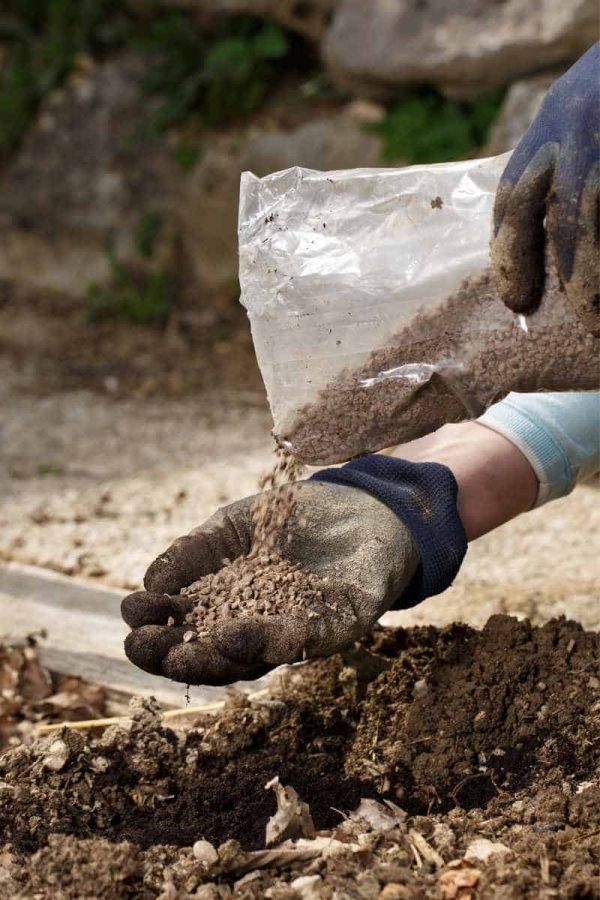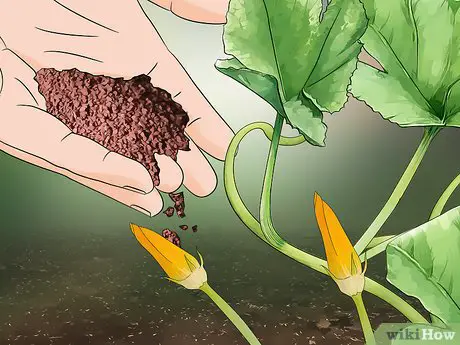Adding potassium to plants is an important part of maintaining a healthy garden. Potassium helps plants grow more vigorously and resist disease. It can be added in the form of fertilizer, compost, or wood ash.
To start, you should test your soil to determine its current level of available potassium. If it’s low, then you need to add potassium-rich materials such as fertilizer or compost to increase the amount available for uptake by your plants. Additionally, you can spread wood ash around the base of each plant which will leach into the soil over time and provide additional nutrients for absorption by the roots.
Lastly, make sure not to overdo it; too much potassium can cause deficiencies in other vital minerals needed for proper plant growth.
How to Add Potassium to an Organic Garden?
- Purchase Potassium Fertilizer: Before you can add potassium to your plants, you must purchase a fertilizer that contains potassium. Look for one specifically formulated for the type of plant you are working with, as some may have different nutrient requirements.
- Test Soil pH Level: It is important to test the soil acidity or alkalinity (pH level) before adding potassium fertilizer so you know how much will be necessary and what type of fertilizers should be used in order to avoid any issues with other nutrients in the soil.
- Calculate Amount of Potassium Needed: Once you have determined the pH level of your soil, use a nutrient calculator online or consult with an expert if needed, to calculate how much potassium needs to be added based on your specific needs and conditions.
- Apply Fertilizer: After calculating the amount of fertilizer needed, disperse it evenly over the area around each plant using either a handheld spreader or broadcast spreader depending on its size and location. Make sure not to apply too much at once so as not burn the plants’ roots!
- Water Plants Thoroughly: To ensure that all nutrients from your newly applied fertilizer get absorbed by the plants’ roots system, water them thoroughly after application. This will also help prevent any potential burning due to excess fertilizing .
Household Source of Potassium for Plants
Household items like banana peels and coffee grounds are excellent sources of potassium for plants. Potassium helps to promote healthy root growth, which enables plants to absorb water and nutrients more efficiently. Additionally, it can help with flowering and fruiting, as well as the overall health of your garden.
You can simply add these items directly into soil or create a compost mixture that you can use as fertilizer.
Homemade Potassium Fertilizer for Plants
Making your own potassium fertilizer for plants is a great way to save money and provide your plants with the nutrients they need to stay healthy. Potassium is an important nutrient that helps promote strong root growth, flower production, and overall plant health. When making a homemade potassium fertilizer for plants, you’ll need ingredients like banana peels, wood ash from a fire pit, or dried kelp powder.
Simply mix the ingredients together in equal parts and apply it directly to the soil of your indoor or outdoor garden once every two weeks during the growing season.
Liquid Potassium for Plants
Liquid Potassium is a great way to provide essential nutrients for your plants. It helps promote healthy growth and can be used as a supplement to soil-based fertilizers. Liquid potassium increases photosynthesis, increases seed production, improves water uptake, and helps build strong root systems in plants.
Additionally, it prevents diseases such as blossom end rot and tip burn on fruit trees.
Best Organic Source of Potassium for Plants
Organic sources of potassium for plants are important in order to ensure optimal plant health. Potassium is an essential nutrient that helps promote strong root growth, increases water and nutrient uptake, and improves disease resistance. Plant-based sources of potassium include seaweed extract, banana peels, wood ash, compost tea or manure tea.
With these organic options available, it’s easy to provide your plants with the potassium they need while staying away from chemical fertilizers.
What Plants Like Potassium Water?
Plants require several essential minerals to grow, and one of these is potassium. Potassium helps plants with photosynthesis and other metabolic processes, as well as aiding in water retention. As such, many gardeners swear by the practice of providing their plants with a “potassium-water” solution—that is, water enriched with soluble forms of potassium—to increase the health and vigor of their flowers or vegetables.
It’s important to ensure that you’re using a safe fertilizer or supplement so that your plants don’t suffer from overfeeding; when done correctly, though, watering your plant regularly with potassium-enriched solutions can be an easy way to give them just what they need for healthy growth!
High Potassium Fertilizer
High potassium fertilizer is essential for plant growth, as it helps to increase the uptake of nutrients and minerals in the soil. It also helps to improve root development, enhancing a plant’s ability to absorb water and provide strong support for its stems. Potassium fertilizers can be applied either directly or through irrigation systems, depending on the type of plants being grown.
How to Add Potassium to Soil Organically?
Adding potassium to soil organically is a great way to provide essential nutrients and improve the overall health of your plants. Potassium can be added naturally by using wood ash, fruit skins or banana peels, kelp meal, or greensand. Wood ash should be applied at the rate of approximately one pound per 100 square feet while fruit skins and banana peels should be chopped up finely before being worked into the soil’s surface.
Kelp meal and greensand are excellent sources of slow-release potassium that will last for months after application. By adding these natural sources of potassium to your soil you’ll help ensure healthy growth for all your garden plants!
Organic Sources of Potassium for Plants
Organic sources of potassium are important for providing essential nutrients to plants. Potassium is an essential macronutrient, meaning that it must be supplied in relatively large amounts in order to maintain healthy plant growth and development. Organic sources of potassium include compost, green manure, bone meal, wood ash, fish emulsion and seaweed extracts.
These organic sources provide a much-needed boost of potassium to soil without the use of synthetic fertilizers or chemicals.

Credit: growfully.com
What is the Fastest Way to Add Potassium to Soil?
Adding potassium to soil is an essential part of maintaining a healthy and productive garden. Potassium helps plants take up essential nutrients, aiding in their growth and development. The fastest way to add potassium to your soil is through the use of fertilizers that are specially formulated with high levels of potassium.
You can also apply wood ash or potash directly to the soil as these materials contain significant amounts of this important mineral element. If you want a more organic approach, you can use green manures such as clover or alfalfa which release natural nitrogen into the soil while adding phosphorus and other minerals like potassium over time.
Finally, it’s possible to increase the level of available potassium in your soil by using composted manure from animals such as cows, horses and sheep; however, this method requires some patience since it could take several months for the manure to properly break down before becoming available for uptake by plants.
What is a Good Source of Potassium for Plants?
Potassium is an essential nutrient for plants and helps in many vital processes such as photosynthesis, plant growth and resistance to stress. A good source of potassium for plants is organic fertilizers like compost and manure because they are natural sources that can provide the required amount of potassium and other minerals needed by the plants. Compost supplies a slow release of nutrients which gives plants steady growth over time, while animal manures tend to be richer in nitrogen but also contain a significant amount of potassium.
Additionally, commercial fertilizer blends formulated for specific crops or soils may include higher amounts of potassium than what could be supplied from organic matter alone. When supplementing with chemical fertilizers, it’s important to follow the manufacturer’s instructions closely so you don’t end up giving too much or too little—too much can lead to toxicity symptoms just as too little will stunt plant growth due to lack of nutrients. By monitoring soil fertility levels with regular soil tests, you’ll ensure your plants are getting enough nutrition from their food sources whether it’s organic or synthetic fertilizer.
How Do You Make Potassium Water for Plants?
Potassium water can be an effective way to provide plants with the nutrients they need. To make potassium-enriched water for your plants, you’ll need a few supplies: Epsom salt or potassium sulfate, a measuring cup, and your garden hose (or other large vessel). First fill up your garden hose with water until it’s about half full.
Then measure out two tablespoons of either epsom salts or potassium sulfate, making sure to dissolve them completely in the water. Once dissolved, add this solution to the remaining amount of water in the garden hose and stir gently. This will ensure that all of the minerals are evenly distributed throughout the mixture.
Finally, use this nutrient-rich mixture to water your plants every 7-10 days so that they have access to these essential nutrients!
What Can I Use to Add Potassium to My Soil?
Adding potassium to your soil is a great way to ensure that your plants have access to all of the nutrients they need in order to grow healthy and strong. Potassium helps plants absorb water, move essential minerals through their systems, and produce proteins and starches. While there are many commercial fertilizers available on the market which contain potassium, it may be more cost-effective for you to use natural sources like compost or manure.
Compost is full of useful organic matter that can help build up your soil’s structure over time while also providing a steady supply of nutrients like potassium—simply mix it into your garden beds as needed! Manure from horses or cows is another excellent source of fertilizer; however, make sure that it has been aged appropriately before applying it directly onto any plant roots as its high nitrogen content can burn them if applied too heavily. Finally, wood ash from fires can provide an additional boost of potassium and other trace elements when finely mixed into the topsoil around established plants.
No matter what method you choose, adding extra potassium will give your plants the nutrition they need in order to thrive!
Conclusion
In conclusion, adding potassium to plants can be a great way to ensure their continued health and productivity. It is an essential element of the plant’s growth process, but it must be done carefully so that you don’t over or under-fertilize your plants. Good fertilization practices combined with proper irrigation will help keep your plants healthy and robust for years to come!
